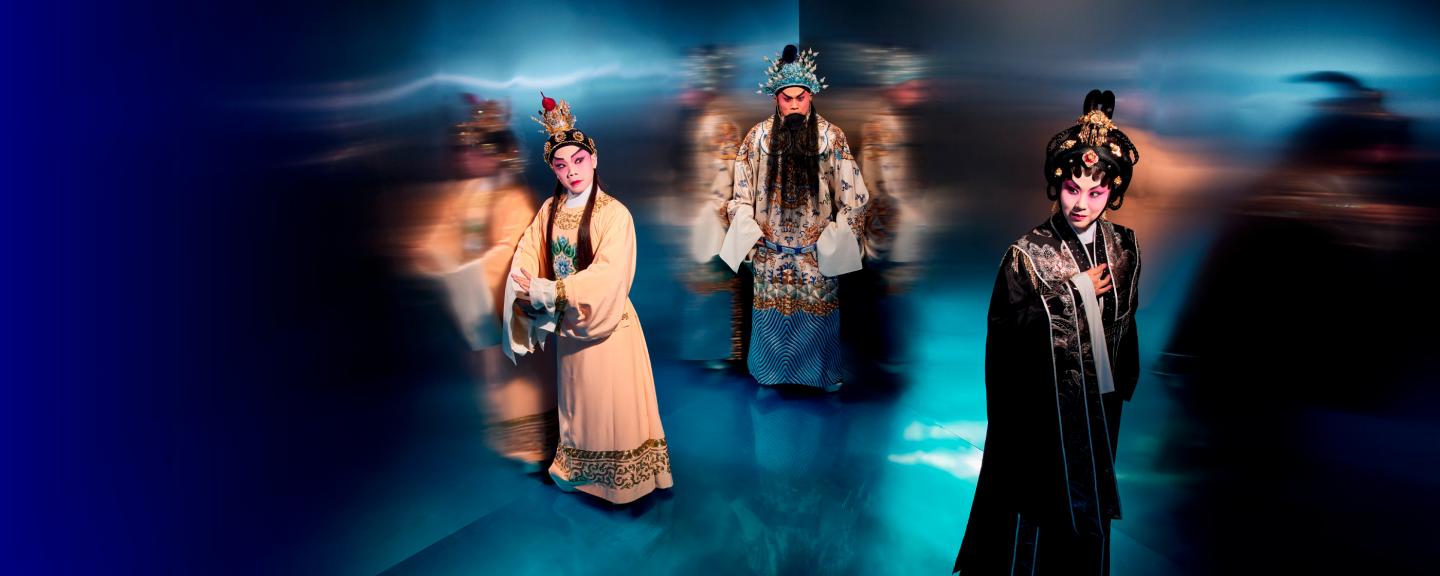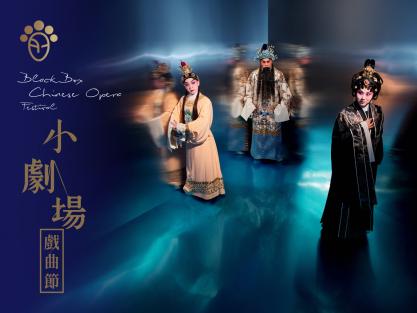Main
Description
戏曲中心小剧场粤剧系列第三部原创作品,《霸王别姬》(新编)及《文广探谷》的监制兼导演钟珍珍领军,黎耀威和黄宝萱再度联合编剧、导演、编曲,与艺术新秀奖得主吴立熙,及青年演员沈柏铨共同演出。
剧中演员将传统身段唱腔与现代音乐结合,并运用录像设计及现代剧场的舞台装置及各种元素,营造尔虞我诈的气氛,同时思考宿命论:到底命运是否早被注定?
「奉天承运,皇帝诏曰……」于太庙领旨的武成王、文贵妃和敦华太子尚在忖测圣意之际,传旨太监突倒下,圣旨上却只有「王位」,这二字不单戳破三人的野心,更牵扯出皇族之间的权谋和心计。宫廷之内,是否需要不择手段,方可「奉天承运」?
《奉天承运》为戏曲中心首个通达共融的制作,我们经过遴选邀请聋人艺术家黄耀邦参演剧中角色,此外,每场演出均设有剧场视形传译。
冠名赞助:
制作:

艺术及制作团队:
监制、导演:钟珍珍*
编剧、导演、编曲:黎耀威、黄宝萱
技术总监:胡伟聪*
舞台设计:黄逸君
灯光设计:萧健邦
音响设计:温新康
录像设计:方晓丹
助理监制:李嘉隆*
制作经理:卢月芳*、陈嘉仪*
监制助理:庄淑雯*、丘颖晞*
演员:
黎耀威 饰 武成王
黄宝萱 饰 文贵妃
吴立熙 饰 敦华太子
沈栢铨 饰 荣谦
黄耀邦 饰 荣福
乐师:
音乐领导:毛奕俊
击乐领导:陈定邦
乐师(依笔划序排名):何卓晋、何卓涛、高永熙、梁淑妍、陈一凡、黄婉苓、黎家维、钟诗玲、苏绍勋
*西九文化区职员
Additional info
Tabs
Following Farewell My Concubine (New Adaptation) and Wenguang Explores the Valley, The Imperial Decree is the Xiqu Centre’s third experimental Cantonese opera production.
Unlike its two predecessors, which were inspired by historical events and existing plays, The Imperial Decree features an original story. Through a plot pregnant with intrigue, twists and clashing personalities, it explores the existence of fate and freewill.
The production employs a series of artistic and technological innovations that transform the viewer experience on several levels. It breaks away from the traditional Cantonese opera storytelling format, and combines classical performance techniques with contemporary music and dance. Meanwhile, modern technological installations bring to the stage another dimension of reality where space and time can shift in an instant. Video, lighting and sound effects, along with the set design, come together to vividly illustrate the interiors of the characters, creating a Cantonese opera experience that’s entirely refreshing and unique.
In addition, for the Xiqu Centre’s first inclusive production, we were committed to upholding the spirit of inclusivity throughout the writing and making of the show and providing the space for artists with different abilities to showcase their immense talent. In the end, it gave The Imperial Decree all the more depth and heart. We hope that by working with differently-abled people, we can strengthen the connections between the public, Cantonese opera culture and our communities, and promote diversity and inclusion through the beauty of Cantonese opera.
Cantonese Opera
Originating in the Guangzhou region of southern China, Cantonese opera is a genre of Chinese traditional theatre that is popular in Guangdong, Guangxi, Hong Kong and Macau, as well as the Chinese diaspora in Southeast Asia, America and Europe. The singing style adopts elements of bangzi and erhuang (traditional vocal and phrasing styles), and combines tunes of various origins, including set tunes from gaoqiang (high-pitched) and Kunqu genres and elements of folk narrative singing. Cantonese opera was inscribed onto the UNESCO Representative List of the Intangible Cultural Heritage of Humanity in 2009.


